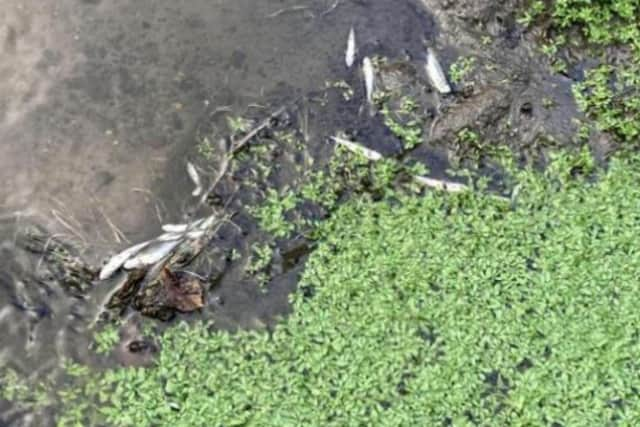Investigation launched after hundreds of fish die in North Yorkshire village
The Environment Agency (EA) said it is working to establish the cause of the deaths, after the fish were discovered in a stream in Elvington this week.
The agency also said there is currently no evidence to suggest the deaths are linked to a heating oil leak, which was first reported in January and blamed on a local business.
Advertisement
Hide AdAdvertisement
Hide Ad“After carrying out an assessment of the beck, no evidence of oil was found in the watercourse and the dissolved oxygen level was good,” a spokesman said.


“Clearly any dead or distressed fish is worrying to see and we are carrying out investigations into the incident to determine the cause.
“We will not hesitate to take action against polluters – which can include prosecutions – when necessary. It is important people who spot pollution incidents or fish in distress report it.”
Christian Vassie, of City of York Council, said he saw hundreds of dead fish in the beck, near Elvington Church of England Primary School, earlier this week.
Advertisement
Hide AdAdvertisement
Hide AdThe Liberal Democrat councillor said he is also “incredibly frustrated” about the “totally unacceptable” heating oil leak.
“Those responsible have been instructed to fix the leak and to remove the land and soil that has been contaminated,” he said.
“The EA assured me that the oil is not coming from a business selling heating oil but from a business using it to heat their premises.
“The city council has finally escalated its response and is now asking for answers and action. I have repeatedly asked the EA at what point they will move to prosecute.”
Advertisement
Hide AdAdvertisement
Hide AdAndrea Tranter, who has lived in the village for 11 years, said she has “never seen anything like this”.
"It is probably not just the fish being affected but things further up the food chain in the circle of life as well,” she said.
“We can't afford to lose so much in one go and clearly they suffered in the process."
In June, the EA responded to a large number of fish deaths in rivers and streams around the country, following a spell of hot weather.
Advertisement
Hide AdAdvertisement
Hide AdThe agency said extreme temperatures and thunderstorms can be “highly dangerous” for fish, but deaths are often caused by a combination of several factors including water levels or flows, algal blooms, pollution and diseases.
When EA workers find fish in distress during periods of dry weather, they sometimes use aeration equipment to reoxygenate the water or rescue fish when river flows are especially low.
However, the Angling Trust has claimed the spike in fish deaths seen in June was the result of the “appalling abuse our rivers face”.
In a statement, the group said: “Our rivers simply do not have the resilience to function in anything like a natural freshwater ecosystem.
Advertisement
Hide AdAdvertisement
Hide Ad“Through poor water quality, pollution and, in places, over abstractions and low flows, we have left our rivers unable to cope.
"The fish suffer because not one of our rivers is in a good chemical state and only 16 per cent are in a good biological state.”